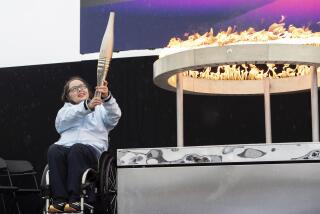Torch gets Vancouver fired up
- Share via
Reporting from Vancouver, Canada — Standing in the predawn chill, holding a cup of coffee with both hands, Sara Reoch recalls that she never wanted the Olympic Games in her city.
Too much money. Too much construction. Too much traffic.
“Oh, God no,” the 59-year-old retired teacher said. “I voted against it.”
And in the years since a contentious referendum supported Vancouver’s pursuit of the Games -- it passed by less than two-thirds -- her voice contributed to a steadily growing chorus of public dissent.
Yet, on Friday morning, with the opening ceremony hours away, none of this kept Reoch from joining an estimated crowd of 150,000 lining miles of streets to cheer and wave flags as the torch went past.
“The Olympics are here and you can’t change that,” she said. “Why not enjoy it?”
This sentiment reflects a last-minute shift in mood here. Despite continued protests -- some 1,500 rallied downtown Friday afternoon -- many Vancouverites seem willing to put aside their concerns, at least for the next two weeks.
“The banners have gone up and lots of visitors are arriving,” said David Anderson, a University of British Columbia professor who has monitored public reaction. “There’s the perception that some sort of party is about to ensue.”
As local gossip blogger Lainey Lui put it: “There’s a buzz that’s definitely building.”
This love-hate relationship makes sense in a city where political affiliations divide almost equally between the Liberal and New Democratic parties, adding fuel to a history of public debate.
In other words, people here tend to argue, albeit in a politely Canadian manner.
This time, much discord focused on spending a projected $5.6 billion for a brief spectacle instead of helping the troubled Eastside, where homelessness, addiction and prostitution abound.
Residents complained about no-parking zones, restricted lanes and thoroughfares closed to accommodate the Games. They fretted over planned protests -- some of which drew outsiders -- and also about police treating the protesters with respect.
Then the economic crisis hit.
“Nobody was expecting that,” Anderson said. “There was the heightened anxiety of, ‘Oh my goodness, we’ve committed all this money.’ ”
As recently as late January, a poll conducted by Angus Reid Public Opinion found only half of British Columbia residents expected the Olympics to have a positive impact on their province.
This wasn’t the first time the extravagant cost and inconvenience required to stage the Games had generated angst in a host city.
By most accounts, attitudes began to change as officials hung an estimated 6,000 banners along streets and businesses plastered their windows with posters reading “Go Canada Go.”
Then came the torch relay.
Officials predicted that 10 million Canadians would view the flame as it traveled across the nation, a guess that now seems conservative.
On tiny Bowen Island, off the British Columbia coast, Olympic officials said 5,000 people turned out in the early morning. Subsequent crowds in and around Vancouver were particularly large and boisterous.
By Friday morning, with Gov. Arnold Schwarzenegger carrying the flame through Stanley Park toward downtown, people stood two- and three-deep for long stretches. Sarah Kapetaneas, who left the counter of her coffee shop to watch, became teary-eyed.
“I didn’t think I would get that choked up,” the 27-year-old said. “It’s just really great to see so many people come together over one thing.”
While Vancouver’s Olympic organizing committee remains unpopular, and residents still worry about costs, a follow-up Angus Reid poll suggests that 65% now have a positive outlook on the next two weeks, with negative responses falling to 22%.
That’s not to say grumbling won’t resume when the Olympics end and residents are left to foot the bill.
But such concerns felt distant on a recent afternoon as shoppers lined up outside a store hawking Olympic merchandise. Avril Brett pointed across the street to a costumed mascot dancing among the crowd.
“Sometimes this can be a ‘no fun’ city,” she said. “I mean, now there’s a fuzzy blue guy on the corner ... how awesome is that?”
david.wharton
@latimes.com
twitter.com/LATimes
Wharton
Times staff writer Kim Murphy contributed to this report.
More to Read
Go beyond the scoreboard
Get the latest on L.A.'s teams in the daily Sports Report newsletter.
You may occasionally receive promotional content from the Los Angeles Times.







